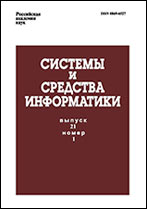|
A priori Weibull distribution in Bayesian balance models
E. N. Arutyunova, A. A. Kudryavtsevb, A. I. Titovab
a Institute of Informatics Problems, Federal Research Center "Computer Science and Control" of the Russian Academy of Sciences, 44-2 Vavilov Str., Moscow 119333, Russian Federation
b Faculty of Computational Mathematics and Cybernetics, M. V. Lomonosov
Moscow State University, 1-52 Leninskiye Gory, GSP-1, Moscow 119991,
Russian Federation
Abstract:
This paper is devoted to Bayesian balance models, which imply separation of factors affecting the system under study, into positive, i. e., contributing to functioning, and negative, i. e., impeding functioning. To study the effectiveness of the system, the balance index, equal to the ratio of negative and positive factors, is concerned. It is assumed that the factors depend on environment, and it is not possible to determine their exact values due to lack of time and material resources, imperfect measuring equipment, etc.; however, the laws governing factors' alterations remain unchanged and are known a priori to the researcher. Under these conditions, it is reasonable to use the Bayesian method, which implies randomization of the initial parameters and, hence, the balance index, under the assumption that a priori distributions of the factors are known. In this paper, the probabilistic characteristics of the balance index in the case when both factors have a priori Weibull distribution are concerned. This work continues a series of studies on the application of Bayesian methods in problems of mass service and reliability.
Keywords:
Bayesian approach, balance models, mixed distributions, Weibull distribution, gamma-exponential function.
Received: 28.12.2018
Citation:
E. N. Arutyunov, A. A. Kudryavtsev, A. I. Titova, “A priori Weibull distribution in Bayesian balance models”, Sistemy i Sredstva Inform., 29:1 (2019), 174–179
Linking options:
https://www.mathnet.ru/eng/ssi631 https://www.mathnet.ru/eng/ssi/v29/i1/p174
|

|




 Contact us:
Contact us: Terms of Use
Terms of Use
 Registration to the website
Registration to the website Logotypes
Logotypes








 Citation in format
Citation in format 